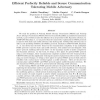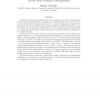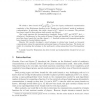135
click to vote
CORR
2011
Springer
14 years 9 months ago
2011
Springer
We study cellular automata with respect to a new communication complexity problem: each of two players know half of some finite word, and must be able to tell whether the state o...
177
click to vote
CC
2010
Springer
15 years 23 days ago
2010
Springer
Abstract. We prove lower bounds on the randomized two-party communication complexity of functions that arise from read-once boolean formulae. A read-once boolean formula is a formu...
110
click to vote
ECCC
2007
15 years 2 months ago
2007
A central line of research in the area of PCPs is devoted to constructing short PCPs. In this paper, we show that if we allow an additional interactive verification phase, with v...
130
click to vote
IPL
2006
15 years 2 months ago
2006
We study the problem of Perfectly Reliable Message Transmission (PRMT) and Perfectly Secure Message Transmission (PSMT) between two nodes S and R in an undirected synchronous netw...
114
click to vote
CC
2007
Springer
15 years 2 months ago
2007
Springer
We initiate a study of tradeoffs between communication and computation in well-known communication models and in other related models. The fundamental question we investigate is t...
103
click to vote
CORR
2006
Springer
15 years 2 months ago
2006
Springer
Despite the apparent similarity between shared randomness and shared entanglement in the context of Communication Complexity, our understanding of the latter is not as good as of ...
148
click to vote
DC
2008
15 years 2 months ago
2008
We consider a distributed system where each node keeps a local count for items (similar to elections where nodes are ballot boxes and items are candidates). A top-k query in such ...
CORR
2008
Springer
15 years 2 months ago
2008
Springer
The tendency of semidefinite programs to compose perfectly under product has been exploited many times in complexity theory: for example, by Lov
101
click to vote
CORR
2008
Springer
15 years 2 months ago
2008
Springer
We obtain a lower bound of n 1 k+1 22k (k-1)2k-1 on the k-party randomized communication complexity of the Disjointness function in the `Number on the Forehead' model of mul...
110
click to vote
CORR
2010
Springer
15 years 2 months ago
2010
Springer
We present a new example of a partial boolean function whose one-way quantum communication complexity is exponentially lower than its one-way classical communication complexity. T...



